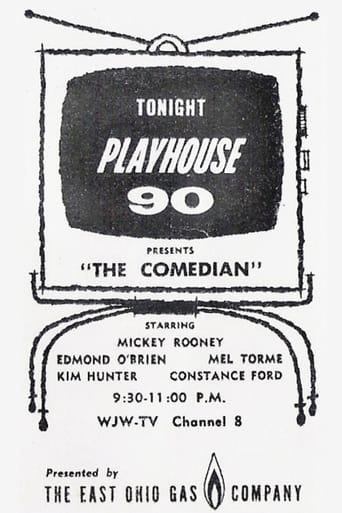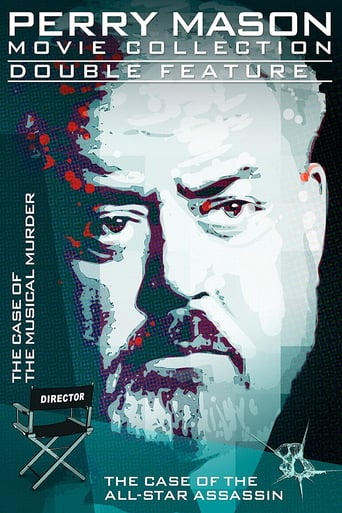audrablum
This week I watched the episode The Comedian (1957) from the Playhouse 90 television series. A comedic television personality with a Mr. Hyde personality and a god-complex backstage makes life miserable for everyone around him including his manager brother. This episode was amazing in the fact that it was not edit intensive and much of the story was taped live. Surprisingly for the shooting style it remained highly engaging throughout the entire film. Mickey Rooney played the difficult personality of the comedian named Sammy Hogarth, who bullies everyone around him. The interesting thing about this viewing experience is that it seems very relatable. This is a very real personality and those of us who have experienced this can attest that Mickey Rooney's portrayal of Sammy was spot on to this personality type. The sad thing about this show is that it seems like a desperate cry for help from people in the film and television industry. It says that this abuse in the industry is overlooked and no one seems to care. This episode was actually based on a novel by Ernest Lehman and the screenplay was written by the Twilight Zone founder Rod Serling. The screenplay was very strong and I think some of its greatest strengths are that it uses the character of Sammy Hogarth as the abusive, self-inflated boss to tell a very relatable story, not just in film but in many workplaces. The weakness in this script is what I refer to as the leatherface syndrome, which was a prevalent outbreak amongst directors during the golden age of television. Sufferers of this disease would cast actors and write screenplays where old men would hook up with women who could be their granddaughters. The writers and directors minds would delude them into believing that not only would these young, attractive, 20 year old women fall for their grandfathers, but the men they would fall for would look nothing like a George Clooney or Tom Cruise. Thankfully, years later the outbreak subsided and directors and writers were no longer as prone to this disease.
The episode was directed by John Frankenheimer, who would later write classics like Reindeer Games (2000). One of the strongest points of directing was the fact that this episode used very little editing (as stated earlier in this review). This appears to have taken quite a bit of contemplation and direction to pull off effectively and a part of me wonders if we still have this level of directing talent today, or if anyone really cares.
billseper
Mickey Rooney plays Sammy Hogarth, a famous comedian of stage and television, adored by the masses, hated and despised by his intimates.There are two plots here, the lesser involving Sammy's brother, Lester, played by Mel Torme--a grown crybaby who clings to his big brother's shirttail from which comes his job as an abused go-for, and along with the job comes a weekly sketch portraying him as Lester the bumbling fool. There's a desire to get out from under this character abuse, but poor, weak Lester hasn't the backbone to properly make his stand without the aid of his endearing, but troubled wife played by Kim Hunter.Edmond O'Brien plays the pivotal role in this production as Sammy's head comedy writer, and the plot involving a less than honorable script he's come up with is the real fuel for this story. Deceit is the name of the game in this television... well, let's call it a mini-movie since that's what Playhouse 90 more or less turned out, and as usual, O'Brien upstages pretty much everyone he's on screen with. Mickey Rooney certainly gives him a run for his money though. Unfortunately, these bad guy type roles Rooney started playing in the 50s were a big part of what contributed to his losing the public's admiration even though he did them well.I don't think you'll be disappointed with anything, except perhaps the ending, which may leave you less contented than ole' Bossy on a late milking day. It's done well though.
theowinthrop
I suspect there were two figures, maybe three, who were the basis for the character of early television comic giant Sammy Hogarth in this drama. First there were Sid Caesar and Red Buttons, both of whom were notably difficult to write comedy for (Caesar less than Buttons, in that he was just outspoken when presented by second-rate material; Buttons made a name for himself - and a hash of his comedy variety success - by firing comic writers almost weekly in the second year of his show). The other may be Arthur Godfrey, another "beloved" television personality of the 1950s who was something less than likable in his relations with his staff (ask the unfortunate Julius La Rosa, for example).THE COMEDIAN was a drama by Rod Sterling that was revived on television by Sonny Fox in 1994 in a series showing the best surviving kine-scopes of live television shows from the golden age of television drama. The others included the original BANG THE DRUM SLOWLY, NO TIMES FOR SERGEANTS, and REQUIEM FOR A HEAVYWEIGHT. THE COMEDIAN starred Mickey Rooney as the energetic, dynamic, and totally lousy Hogarth, an ego-maniacal comic genius who demanded the best from everyone around him. He dominates his nervous and downtrodden brother, Lester (Mel Torme, in a surprisingly good performance as a snook who finally seems to grow claws). Kim Hunter plays Julie Hogarth, the wife of Lester, whom has had to fight off the attentions of Sammy. And Edmund O'Brien plays Al Preston, a script writer for Hogarth who is finding the comedian less and less easy to work for and less and less satisfied by his work. Preston's wife Connie (Constance Ford) is trying to convince him that despite the salary it is not worth the aggravation tied to such a creep as Hogarth. O'Brien is almost convinced, and then a disaster hits in the form of a script.Before Preston had been on the staff, another writer worked for Hogarth, and this writer had died. That was why Preston was hired. What Hogarth did not know was that the previous writer had written a full script for Hogarth, and Preston ends up in possession of the script. But the script is in the other writer's name, and if Preston uses it, and the act becomes known, it can ruin his reputation. But if it is used and nobody discovers the truth, Preston's reputation is secured.In the meantime, Hogarth does a series of jokes about noted critic Elwell (Whit Bissell). Elwell discovers all about Hogarth's relationship with his sister-in-law, and publishes it. While this is going on, the purloined script is being produced, and Hogarth is very pleased by it. But each day approaches the date of the television production, and Preston is growing worried. Is he sure he's safe, or will the truth come out to hurt him? Like the contemporary film THE GREAT MAN (also based on Arthur Godfrey), and the business in the contemporary British comedy THE NAKED TRUTH (or YOUR PAST IS SHOWING) concerning British television star "Wee Geordie" MacGregor (Peter Sellers), THE COMEDIAN showed the difference between the real world of television personalities and the final production the public loved. It strives too hard at times at being a bit philosophical (O'Brien finally demanding from Rooney what makes him tick - in real life he would not have bothered to ask). But the drama was a very good one, and certainly added to the laurels of it's five stars (Rooney, O'Brien, Ford, Hunter, and especially Torme). And it added another feather to the legend of Rod Sterling, that peerless television dramatist before the coming of THE TWILIGHT ZONE.
Steven Mears
A searing behind-the-scenes look at a larger than life television personality, which still packs a punch today in spite of its many imitators. Written by "The Twilight Zone"'s Rod Serling as a "Playhouse 90" televised drama, it contains an explosive performance by Mickey Rooney that stands unparalleled in his body of work, prior to or since.Rooney plays Sammy Hogarth, an egomaniacal comedian who demands perfection from everyone around him. His main target is his weak brother, Lester (singer Mel Torme), whose job description basically consists of taking Sammy's round-the-clock abuse, doing his dirty work, and pretending to worship the ground he walks on. Another outlet for Sammy's wrath is his head writer (Edmond O'Brien), who has lost his edge and who, in his desperation to please Sammy, has stolen material from a dead comic. Lester's wife (Kim Hunter) is fed up with her husband's role as Sammy's whipping post, and threatens to leave him if he doesn't rectify the situation. His opportunity to do so comes when he catches wind of the plagiarism, and he threatens to expose Sammy to an acidic columnist unless he cuts a monologue which savagely ridicules Lester.All of the events in the story lead up to a 90-minute telecast which Sammy believes will be the highlight of his career, and must therefore be flawless. That means no last-minute cuts the day before the show, especially the monologue. O'Brien is forced to be the go-between amongst Sammy, Lester, and the columnist, navigating his way with carefully chosen words and ego-stroking. The film is told largely from O'Brien's point of view, and the audience can honestly feel for him as he digs himself into an ever-deeper hole. However, Serling's screenplay is too smart to portray Sammy as a one-dimensional hothead. Actually, he's not at all predictable. In a lesser film, upon discovering the theft of material he would simply explode, screaming his lungs out at everyone in sight. Watch the finesse with which he handles the situation here, and you will witness a marriage of great writing and direction (by John Frankenheimer).That's not to say that Sammy isn't a hothead. As played by Rooney, in a grand, scenery-chewing performance, he is a man so determined to win the undying love of all his fans that he will go to any extreme in achieving that end. Torme demonstrates great acting potential in the role of the spineless brother. His final on-camera breakdown is amazing. O'Brien has perhaps the film's most difficult role, walking a very narrow tightrope and pulling it off marvelously. The most amazing part of the production is the fact that it was filmed live, with no second chances. The actors were obviously comfortable with their assignments, as they were able to move past plain remembrance of lines and create expressions, gestures, etc. "The Comedian" stands as a testament to the capability of television to tell stories in an equally compelling manner as theatrical films.




